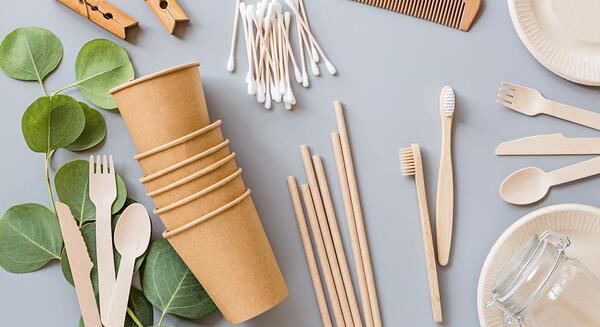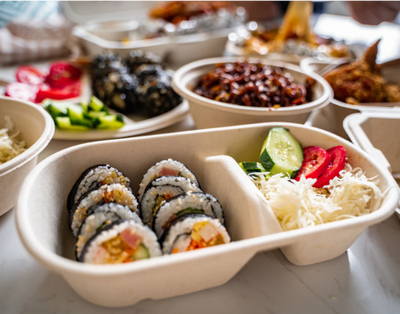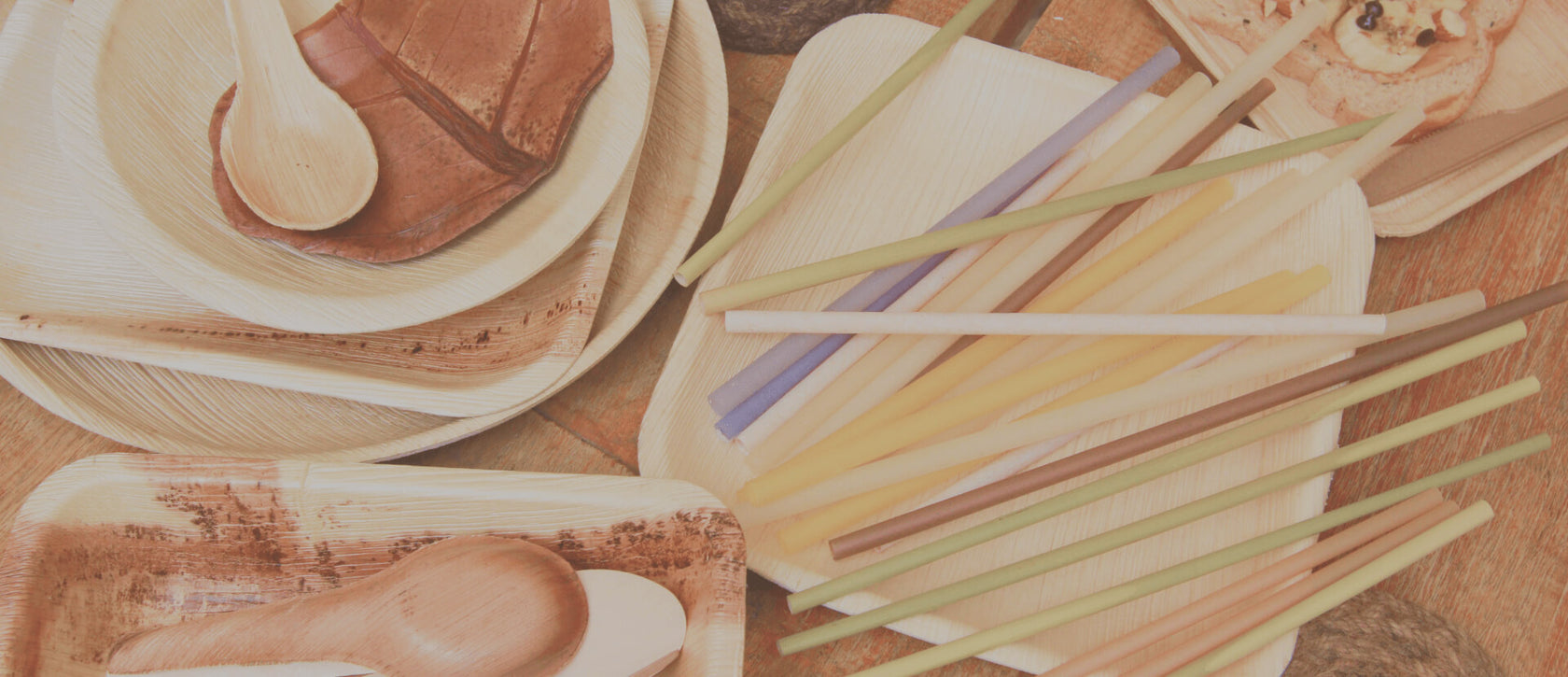"Biodegradable" is the word on everyone's lips as we continue to delve into the possible answers to one of the biggest environmental catastrophes to plague the planet - plastic pollution. As we continue to gain access to footage, statistics, and facts surrounding climate change, vendors are all trying to keep up with the growing market of organic products. Food and beverage enterprises are progressively employing the use of biodegradable straws, instead of single-use plastic straws. To you some clarity on the current landscape, we’ve collected valuable information to bring us one step closer to answering the question "What are biodegradable straws made of?" and share the meaning behind the label.
What Are Biodegradable Straws Made Of?
There is still some confusion circling around regarding what biodegradable explicitly means, despite its prevalent use in our daily life. Put simply, the term "biodegradable" indicates the ability of certain materials to break down. Truth be told, plastic can break down too, but at what cost? All living creatures pay the price for the toxic microplastics that leak into the natural environment every year during plastic decomposition.
Alternatively, biodegradable is the term used for organic products made from plants, ones that can break down effectively and safely into organic substances with the help of live bacteria. This process expands over a drastically shorter period, unlike the centuries-long life of plastic products that may be used for only moments, but intend on lasting more than decades.
Unbelievably, types of biodegradable straws are made of natural materials like grass, rice, coffee, sugarcane, and even coconuts! Moreover, they can rapidly degrade when left in the natural environment, taking only mere months or weeks. It is without a doubt that plant-based compostable straws are one of the best alternatives to plastic straws!
>> Read More:
- How to Avoid Microplastics: 10+ Daily Exposure Sources
- Rice Straws: A Complete Guide On New Eco-Friendly Edible Straws
- Coconut Straws: A Sustainable Alternative To Plastic Straws
- Biodegradable Sugarcane Straws For Drinks: How Are They Made?
- What Are Grass Straws? Why You Should Use Grass Straws | EQUO

Reasons Why Biodegradable Straws Made From Plants Are Better For The Environment Than Plastic
In today's age of a developing, environmentally-conscious world, disposable plastic straws are seeming all the more concerning than convenient to industries and individuals alike. We should all open our minds to gaining new knowledge and extend our shared understanding of the difference biodegradable straws can make to the environment, animals, and human beings.
Named below are three main reasons why compostable drinking straws are the new go-to for the masses!
Biodegradable straws are safe for marine life
Undoubtedly, the word "plastic" and the disastrous implication that follows it make us wonder about the threats to sea life. It is estimated that every year, our precious ocean must unwillingly endure 8 million TONNES of plastic waste, filling with objects that will take too long to decompose. For anyone exposed to visiting previously idyllic landscapes now affected by pollution, you can continue to observe sea creatures either becoming entangled or accidentally ingesting plastic. It tugs at the heartstrings of even the most emotionless soul, facing the evidence that marine life is constantly battling with a mass-produced plastic waste.
As plastic breaks down, tons of microplastic leak into the open sea. Fish, sea turtles, birds, and other marine species unknowingly consume small pieces of plastic, ultimately choking and suffering. These microplastics, once consumed by and found in seafood, can end up in the human digestive system and cause health problems.
Arguably, biodegradable compostable straws made of plants can decompose rapidly within months, disappearing from landfills before finding themselves in vast oceans. Yet, if biodegradable straws are discovered in the ocean, sea animals are risk-free as they encounter these 100% natural materials, safe for animals to ingest.

Biodegradable straws made from plants are non-toxic
During decomposition, plastic releases hazardous substances into the surrounding environment, both sea or land, known as bisphenol A or BPA. These toxic substances are dangerous to animals and harmful to human health when they inevitably invade our shared food and water supply.
There is light at the end of the tunnel! It is guaranteed that no toxic substances will be released during the use of organic straws; including grass straws, rice straws, sugarcane straws, coconut straws, and coffee straws. Naturally, the bacteria that will appear during the natural straw decomposition will evolve into organic matter - harming no one and nothing.

Biodegradable straws are eco-friendly alternatives to plastic that help reduce carbon footprint
Plastic manufacturing catastrophically burns high amounts of fossil fuels, a primary ingredient when making plastics-based products. This industry is one of the world's largest in terms of greenhouse gas emissions. When it is time for decomposition, plastic instead releases greenhouse gases into the environment, such as ethylene and methane. It is safe to assert that plastics are responsible for significantly contributing to global warming - from production to disposal.
Thankfully, the range of biodegradable straws we mention here is entirely plastic-free! We no longer have to undergo the same devastating and high-energy process required when producing plastics, therefore no greenhouse gases are subsequently released from biodegradable straws during decomposition.
Biodegradable straws, such as coffee or sugarcane straws, are each made of either natural coffee grounds or sugarcane bagasse. This means they are not only non-renewable resources, but also give purpose to excess production leftovers and avoid natural resource waste. These natural straws are sublime eco-friendly choices for those looking for eco-friendly business practices, or even if you are wanting to reduce your personal carbon footprint.
>> Read More:
- The Best Eco-Friendly Alternatives To Plastic That Makes Your Life Greener
- Alternatives For Plastic Straws: A Definitive Guide

Differences Between Biodegradable Straws and Compostable Straws
When faced with the question "What are biodegradable straws made of?" Some may query if there is any true difference between biodegradable or compostable drinking straws. Let's compare and clarify the meaning behind the labels on these organic products.
If a product is classified as ‘biodegradable’, it refers to the decomposition that takes place with the help of bacteria and specific natural conditions; such as temperature, moisture, and light. We cannot place responsibility for the compostability of biodegradable straws, without in turn looking at the rich or lacking compostable environment.
Unlike biodegradable straws, compostable straws biodegrade quickly, regardless of external environmental factors. We can safely assume decomposition time is the most significant factor when identifying the main difference between biodegradable and compostable straws. Whilst biodegradable items take up to six months to decompose fully, compostable ones can take less than three months.

Are Biodegradable Straws Materials Really Biodegradable?
Biodegradable straws are understood as needing sufficient external environmental factors to biodegrade, such as oxygen, light, moisture, and temperature. Therefore it cannot be said with certainty that all biodegradable straws will be 100% biodegradable.
We may enter a grey area as we discover that there are a number of manufacturers that can all too simply stretch the truth behind the biodegradability of some products since plastics can be traced in the ingredients. It is of the utmost importance that customers have access to genuine biodegradable products that will perform well for the user and the environment.
Passionately, EQUO promises to be a brand offering 100% plastic-free and plant-based compostable straws that you can rely on. There are countless environmentally friendly straws by EQUO that can be your dreamy plastic alternatives, such as grass straws, rice straws, sugarcane straws, coffee straws, and coconut straws! One try with these sustainable straws and you will uncover a whole new realm of plastic-free possibilities! Durable, tough, and flexible in hot and cold drinks are more than enough of a reason for EQUO’s plasticless straws to overtake plastic straws in the waging battle for sustainability! Enjoy your favorite go-to drinks every single day, knowing once they have fulfilled their purpose, they will return to compost and do no harm.
>> Read More:
- Best Non-Plastic Straws For Hot Coffee & Other Hot Drinks
- Not-Paper Straws: 7 Best Biodegradable Straws For Our Environment
- 6 Best Reusable Straws 2022 For Drinks, Smoothies, Travel & More
- Compostable Vs. Reusable Straws: Which One Is The Best Eco-Friendly Alternative
- Grass Straws: An Eco-Friendly Product Originated From Vietnam
There is a lot to absorb when investigating the question, "What are biodegradable straws made of?" We are full of hope that you have gained more knowledge about the term "biodegradable", the science, and the statistics surrounding biodegradable straws in particular. With an abundance of eco-friendly product providers, choosing the brand you can trust wants what's best for not only you but also the planet.
At EQUO, you will never once again doubt whether you have bought truly eco-friendly products. Buy biodegradable straws at EQUO, and find various sustainable products for your daily needs; from eco-friendly biodegradable straws to utensils and reusable tote bags.
Contact Information:
- Website: https://shopequo.com
- Fanpage: https://www.facebook.com/equointl
- Twitter: https://twitter.com/equointl
- Linkedin: https://www.linkedin.com/showcase/equo-international/
- Instagram: https://www.instagram.com/equointl/


